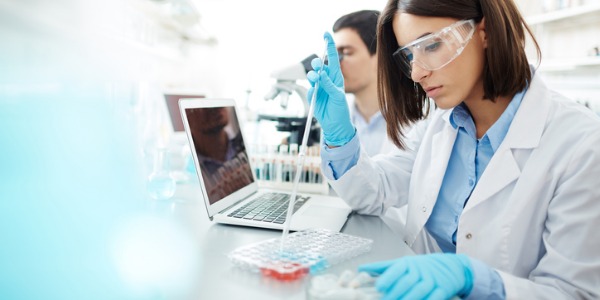What is a Medical and Clinical Laboratory Technologist?
A medical and clinical laboratory technologist is someone who analyzes blood, tissue and body fluid samples in search for microorganisms like parasites or bacteria. They also determine blood type, drug levels, cell count, and chemical content. These technologists perform numerous complicated tests using specialized instrumentation and automated equipment. They are highly trained professionals that collaborate with doctors or laboratory directors on patient data after the test results are analyzed and completed.
Difference between a technologist and a technician: A four-year medical laboratory degree program is needed to become a medical laboratory technologist. A similar two-year degree (or certificate) qualifies the graduate to work as a medical laboratory technician. Technologists generally earn a higher income than technicians do and have more opportunities for advancement.
Get online training through our partner:
What does a Medical and Clinical Laboratory Technologist do?

A medical and clinical laboratory technologist will perform a full range of laboratory tests, from simple blood tests, to more complex tests that will reveal diseases such as cancer, HIV/AIDS, and diabetes. They work in all areas of the laboratory including immunology, microbiology, histology, hematology, chemistry, and blood banking. Clinical laboratory technologists calibrate and operate complex equipment, precision instruments and computers. They are responsible for the accuracy of test results, therefore the results and information that the laboratory technologist gives to the physician influences the medical treatment a patient will receive.
Medical and clinical laboratory technologists assist doctors and nurses in choosing the correct lab tests and ensure proper collection methods. In addition, they maintain the integrity of the laboratory process by recognizing factors that could introduce error and reject sub-standard or contaminated specimens. They will also investigate any discrepant results.
The following are some of the duties that a medical and clinical laboratory technologist may have:
- setting up, calibrating, and sterilizing equipment
- collecting and examining slides of bodily fluids
- collecting and examining blood samples
- matching blood for transfusions
- preparing cultures of tissue samples
- analyzing lab reports
- looking for toxic components in blood or urine
- monitoring for data accuracy
- delivering test results to doctors or researchers
- collaborating with doctors or laboratory directors on patient data
What is the workplace of a Medical and Clinical Laboratory Technologist like?
Medical and clinical laboratory technologists work in hospital laboratories, pharmaceutical firms, research facilities and other lab settings. They are skilled in diverse scientific disciplines, therefore employment outside of the medical laboratory is common. Many technologists are employed in government positions such as the FDA, USDA, non-medical industrial laboratories, and manufacturing. More experienced laboratory technologists may advance by conducting research, developing new methods of analysis and supervising and training laboratory technicians.
Medical and Clinical Laboratory Technologists are also known as:
Clinical Laboratory Technologist
Medical Laboratory Technologist
Medical Lab Tech
Medical Technologist
Clinical Laboratory Scientist